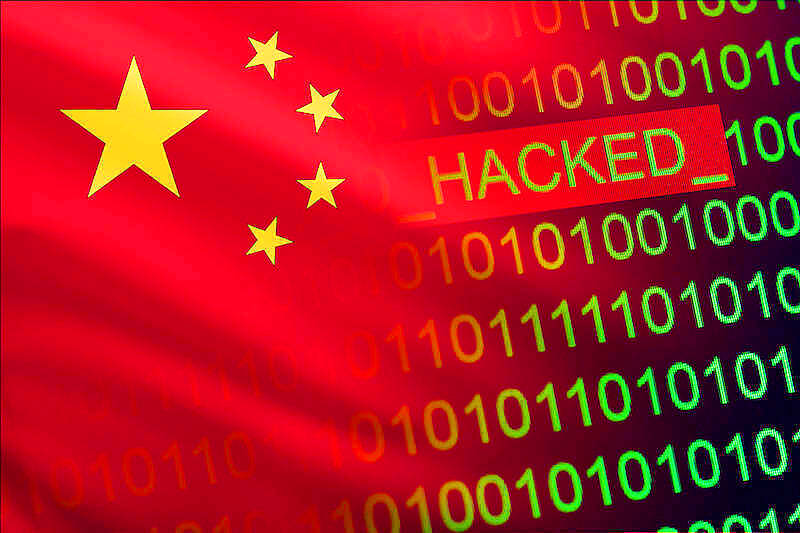The hacker responsible for illegally accessing MacKay Memorial Hospital’s systems and trying to sell patients’ personal information after a failed ransom attempt is a Chinese national named Lo Chengyu (羅政宇), residing in China’s Zhejiang Province, the Criminal Investigation Bureau said yesterday.
The bureau said it has forwarded the case to the Taipei District Prosecutors’ Office on Tuesday and has issued a wanted notice for Lo.
Lo is accused of contravening articles 346, 359 and 360 of the Criminal Code and the Personal Data Protection Act (個人資料保護法).

Photo: AP
Lo’s wanted status makes him the first Chinese hacker who Taiwanese authorities have identified.
MacKay Memorial Hospital was attacked on Feb. 6 by ransomware uploaded by Lo, who went by the pseudonym of Crazyhunter, the bureau’s High-Tech Crime Center Director-General Rufus Lin (林建隆) said.
Lo demanded a ransom of US$100,000, which the hospital refused, Lin said.
The hacker then put the personal information of about 16.6 million hospital patients on sale on Feb. 28, which prompted the hospital to report the hacking to the Taipei City Police Department’s Zhongshan Precinct, Lin said.
The case was jointly investigated by the Taipei City Police Department’s Criminal Investigation Division and the center, Lin said.
Investigators found that 11 establishments had been targeted in cybercrime cases in the past two months, and the malware coding and methods were similar, Lin said.
Police traced the Internet protocols from these cases to Lo, a 20-year-old Zhejiang resident working at an Internet security firm, he said.
Lo had demanded a total of US$800,000 to US$2.5 million from all establishments and received at least US$1 million in illegal proceeds, the bureau said.
Lo’s actions undermined Taiwan’s social order, and his demand for ransom was a psychological threat to Taiwanese, it said.
Additional reporting by Chiu Chun-fu

CHAOS: Iranians took to the streets playing celebratory music after reports of Khamenei’s death on Saturday, while mourners also gathered in Tehran yesterday Iranian Supreme Leader Ayatollah Ali Khamenei was killed in a major attack on Iran launched by Israel and the US, throwing the future of the Islamic republic into doubt and raising the risk of regional instability. Iranian state television and the state-run IRNA news agency announced the 86-year-old’s death early yesterday. US President Donald Trump said it gave Iranians their “greatest chance” to “take back” their country. The announcements came after a joint US and Israeli aerial bombardment that targeted Iranian military and governmental sites. Trump said the “heavy and pinpoint bombing” would continue through the week or as long

TRUST: The KMT said it respected the US’ timing and considerations, and hoped it would continue to honor its commitments to helping Taiwan bolster its defenses and deterrence US President Donald Trump is delaying a multibillion-dollar arms sale to Taiwan to ensure his visit to Beijing is successful, a New York Times report said. The weapons sales package has stalled in the US Department of State, the report said, citing US officials it did not identify. The White House has told agencies not to push forward ahead of Trump’s meeting with Chinese President Xi Jinping (習近平), it said. The two last month held a phone call to discuss trade and geopolitical flashpoints ahead of the summit. Xi raised the Taiwan issue and urged the US to handle arms sales to

State-run CPC Corp, Taiwan (CPC, 台灣中油) yesterday said that it had confirmed on Saturday night with its liquefied natural gas (LNG) and crude oil suppliers that shipments are proceeding as scheduled and that domestic supplies remain unaffected. The CPC yesterday announced the gasoline and diesel prices will rise by NT$0.2 and NT$0.4 per liter, respectively, starting Monday, citing Middle East tensions and blizzards in the eastern United States. CPC also iterated it has been reducing the proportion of crude oil imports from the Middle East and diversifying its supply sources in the past few years in response to geopolitical risks, expanding

Pro-democracy media tycoon Jimmy Lai’s (黎智英) fraud conviction and prison sentence were yesterday overturned by a Hong Kong court, in a surprise legal decision that comes soon after Lai was jailed for 20 years on a separate national security charge. Judges Jeremy Poon (潘兆初), Anthea Pang (彭寶琴) and Derek Pang (彭偉昌) said in the judgement that they allowed the appeal from Lai, and another defendant in the case, to proceed, as a lower court judge had “erred.” “The Court of Appeal gave them leave to appeal against their conviction, allowed their appeals, quashed the convictions and set aside the sentences,” the judges